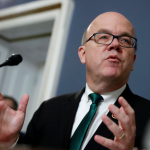Republicans and Democrats are working together on plans to penalize imports of high-polluting goods, a rare bipartisan effort in Congress that could insert climate change policy into U.S. trade rules.
The inspiration for the policy: former President Donald Trump.
Trump was no climate activist, of course — he mocked climate science as a Chinese-inspired hoax and ordered his administration to shred the United States’ efforts to reduce greenhouse gases. But he also advanced a combative trade policy that wielded tariffs as a weapon. And that has opened the door for Republicans to consider a protectionist trade policy linked to addressing climate change, lawmakers engaged in the early discussions say.
“What did Trump do? When you had unfair business practices that gave the other country an advantage over our businesses, he put a tariff on their product,” Sen. Lindsey Graham (R-S.C.), who has been engaging with Democrats on the issue, told POLITICO. “Well, we are trying to move the world to a cleaner environment, and China, India and other countries are not doing as much, and they need to pay a price.”
In this case, lawmakers are taking a new look at so-called border carbon adjustment fees, which would be tacked onto products from foreign companies whose carbon emissions are higher than those of their U.S. competitors. Those products are often cheaper to make abroad because of weak pollution regulations — giving them an economic advantage over more climate-friendly U.S.-based manufacturers of products such as steel.
U.S. policymakers have examined the carbon adjustments for more than a decade, but the policy is gaining new traction as Washington grapples with issues that rose to prominence under Trump, such reinvigorating U.S. industry and competing with China.
It’s also taking on new urgency as the European Union prepares to implement its own carbon border adjustment mechanism, known as “CBAM,” that would apply to imports from countries that lack aggressive emissions-reduction policies. Those countries could include the U.S., where the Biden administration is struggling to pass climate legislation.
Democrats acknowledge that the policy under discussion bears similarities to moves by the Trump administration, though with some key differences.
“It looks and feels a lot like Trump’s tariffs on China, [except World Trade Organization] compliant and in a way that doesn’t distance us away from our allies,” Sen. Chris Coons (D-Del.) told POLITICO. “That is a win for everybody. Recognizing we need new and stronger tools in our competition globally that will bring us closer to our allies and disadvantage some of our adversaries, that is a common view across a range of Republicans and Democrats.”
Coons and Rep. Scott Peters (D-Calif.) introduced legislation, S. 2378 and H.R. 4534, in July to establish a border carbon adjustment on polluting imports that covered steel, aluminum and cement, as well as natural gas, petroleum and coal.
The duo pitched the plan as a way to raise revenue for Democrats’ sprawling social and climate spending agenda, and as a tool to protect U.S. industries exposed to domestic climate rules while prodding foreign polluters such as China to boost their emissions-cutting efforts.
The bill was not included in the House-passed version of Democrats’ Build Back Better Act, H.R. 5376, which has since stalled in the Senate. But Coons’ proposal sparked bipartisan discussions that are backed by a broad coalition of outside groups — including representatives of labor, business and environmental organizations — who are exploring how the U.S. could craft a border carbon adjustment that could pass Congress.
“This is the place where climate, trade, and manufacturing meet up, where we could make bipartisan progress to protect American jobs as we decarbonize,” said Brad Markell, executive director of the AFL-CIO’s energy task force.
Sen. Kevin Cramer (R-N.D), who met with Graham last week to discuss the idea and is interested in talking to Coons about his bill, said the biggest challenge will be reconciling the differing motivations that are bringing Democrats, Republicans and interest groups to the table.
In an attempt to shore up support from the right wing, Cramer has reached out to former Trump administration officials who back the policy, and has emphasized the geopolitical and economic benefits of imposing a border carbon adjustment.
“What we are working on is an America-first climate policy. Donald Trump should love it. He brought the Republican Party to a tariff position we were never comfortable with previously,” Cramer told POLITICO.
Cramer co-authored an op-ed in December with former Trump national security adviser H.R. McMaster calling for the U.S. and EU to attach a carbon fee to imported goods as part of “a transatlantic climate and trade initiative” that would apply to exports of Russia’s dirtier natural gas.
“I always thought this was an opportunity as part of a national security strategy because obviously the issue of climate change is interconnected with a series of other challenges, such as energy security, water security, and food security,” McMaster said in an interview.
Cramer said he shared the op-ed with other former Trump officials, including Energy Secretary Dan Brouillette and Secretary of State Mike Pompeo.
Robert Lighthizer, Trump’s former top trade adviser, is also interested in the topic, according to his former deputy, Dennis Shea. He said he and Lighthizer submitted a proposal to the WTO in the waning days of the Trump administration to allow members to “countervail” against products made in countries with poor environmental standards, a similar concept to a border carbon adjustment.
“If there is a country maintaining very low environmental standards and as a result their exports are cheaper than similar products here in the United States, and they are using that as a competitive advantage internationally, many people across the political spectrum would find that problematic,” said Shea, who is now at the Bipartisan Policy Center.
But one area where Democrats and Republicans diverge on the issue is climate advocates’ desire to pair any tariff or fee on imported goods with a corresponding domestic carbon price. Many Democrats — and free-market backers — have said for years that such a measure could be an economically efficient way to help drive down carbon emissions.
Graham is an exception among Republicans on the issue, but Cramer said most Republicans are not entertaining a domestic carbon tax.
“When you talk about a carbon price you start raising red flags,” Cramer said.
For Democrats, though, the trade element and domestic carbon price go hand in hand.
“It’s terrific that they [Republicans] are interested in talking about a border carbon adjustment,” Sen. Sheldon Whitehouse (D-R.I.) told POLITICO. “The negative is it doesn’t work without a denominator, and the prospective denominator is a price on carbon. They won’t talk about a price on carbon.”
Many economists and trade experts say it would be hard to get the WTO to approve a carbon border fee for a country that wants to penalize imported goods based on carbon content without taxing its own products. That would raise questions of fairness along with accounting challenges.
“My read of international trade law and what makes sense for the U.S. is if we were actually going to move ahead with a border carbon adjustment in law you would want it and need it to be anchored in policy the U.S. was putting in place,” said Nat Keohane, an economist who is president of C2ES, a nonprofit representing businesses that support climate action.
Given low political odds of Congress taking such action, though, Democrats and some environmental groups are exploring ways to design a carbon import fee without a companion domestic tax.
Coons’ bill from last year would apply the levy regardless of whether Congress passed new laws to reduce emissions. It instead would be designed to match the costs already facing U.S. companies from a hodgepodge of state and federal environmental regulations and policies.
The Sierra Club is circulating a memo arguing a domestic carbon price is not a prerequisite for border import fee.
Instead, the environmental group argues that policymakers could impose a fee based on the additional carbon that goes into a given imported good, such as steel, compared with the carbon that would have been produced in the U.S. to make that good, a concept known as “embodied” carbon.
“We are directly targeting the actual degree of additional carbon that went into this ton of steel or concrete instead of hinging it to an indirect proxy such as a carbon price,” said Ben Beachy, director of the Sierra Club’s Living Economy Program.
Without a carbon tax, Democrats and environmental groups say the U.S. would still need to continually boost its domestic emissions policies in some form, whether through investments or regulations, in order to fairly impose an import fee on countries that don’t pursue aggressive climate action — and avoid being hit with similar levies by other governments. The European Union and Canada, for example, have already implemented domestic carbon pricing systems, and both could impose border carbon adjustments to products from countries that don’t sufficiently impose costs on pollution.
Republicans, however, have more modest ambitions, arguing that the U.S. doesn’t need to strengthen its own policies to proceed with import levies. That’s because the American industrial sector is already less carbon-intensive than virtually any other country.
Manufacturing an average ton of steel in China, for example, causes more than twice as many carbon emissions as in the U.S.
George David Banks, a former international climate adviser to Trump, told POLITICO the first step is for Congress to help define a methodology to measure and compare emissions for goods produced in various countries, an area that is poorly defined.
“What we are talking about is creating an international market that recognizes efficiencies of the U.S. economy relative to others,” said Banks, a fellow at the Bipartisan Policy Center, who is advising GOP lawmakers on border carbon adjustments. “The goal is to create a carbon club that has the market leverage to draw down global emissions.”



















